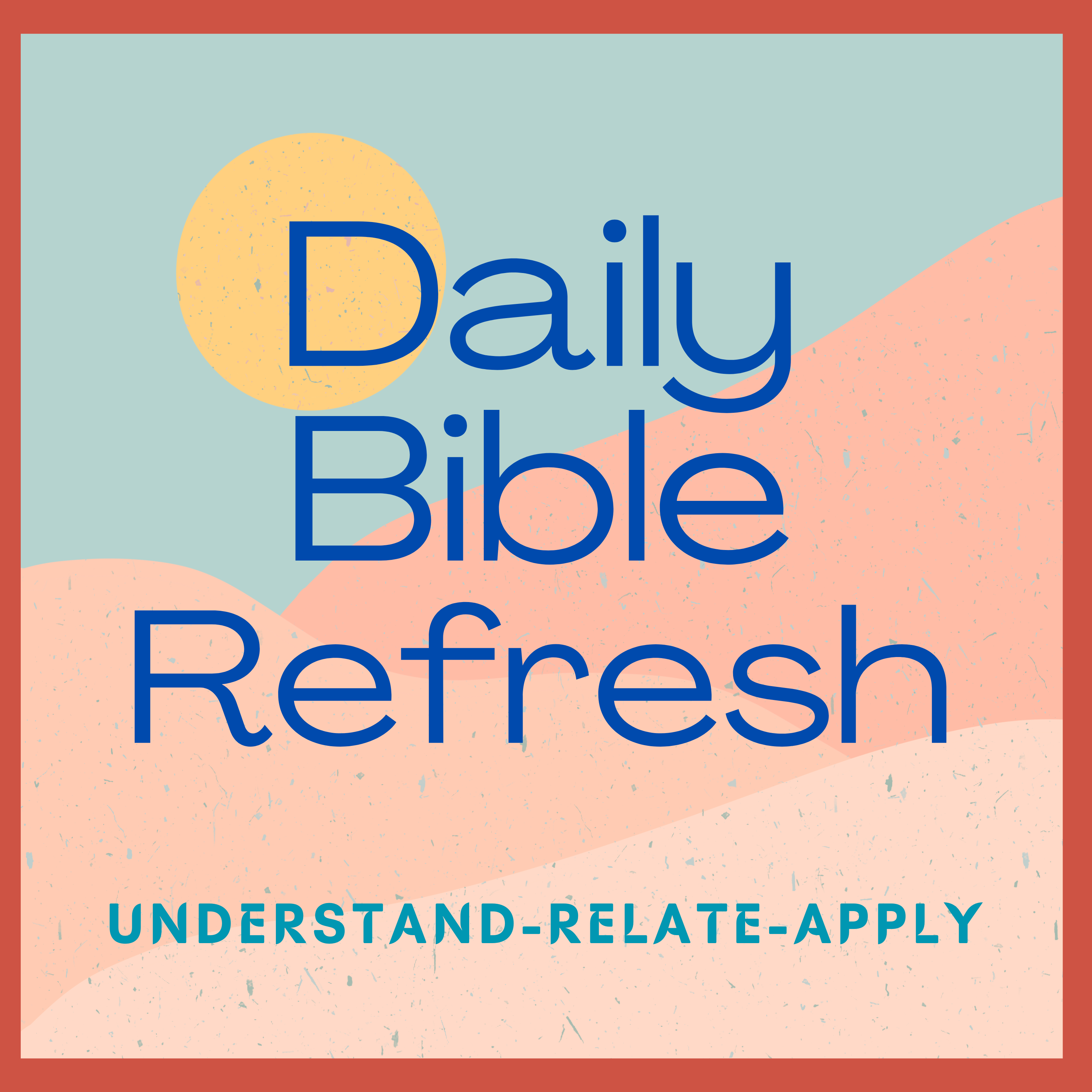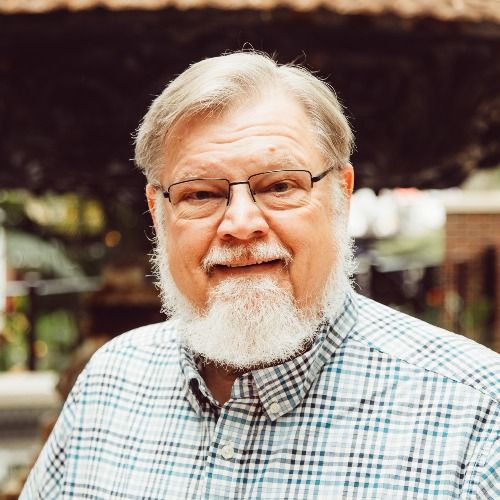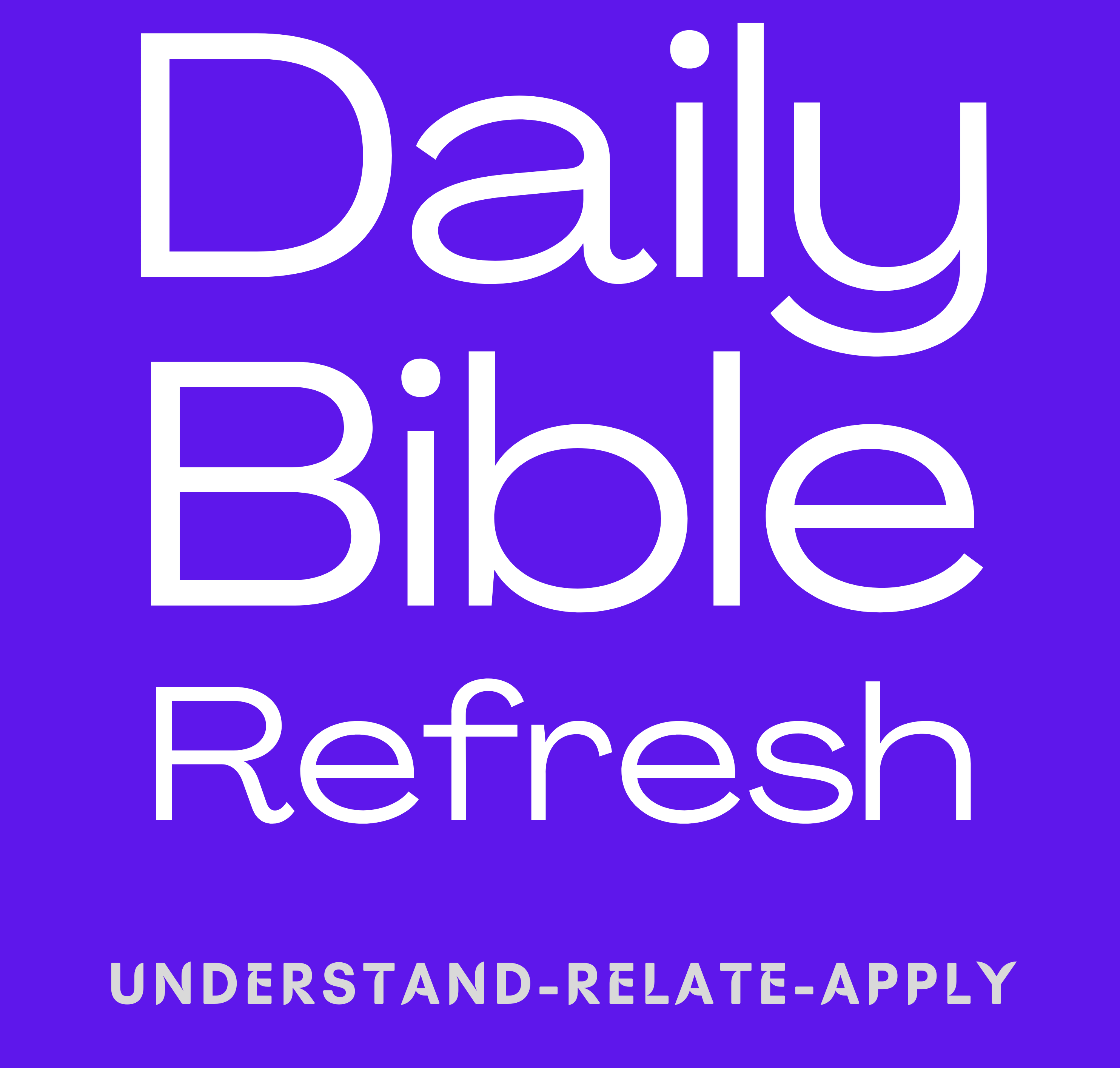Episode 871
Exploring Radical Healing Through Community Care
The "Daily Bible Refresh" is presented each day by Rev. Dr. Brad Miller who has a goal of speaking a bit of the bible into two million ears (one million people) in three years (2025-2028).
He is the author of "The A, B, C-1,2,3 Bible Study Guide" Free to you by clicking HERE.
Brad served as a local church pastor for forty years and has a background in radio and podcasting. Moreover, he is a life-long student of The Bible.
He believes in the words of Jesus that “scripture is fulfilled in your hearing” (Luke 4:21)
The "Daily Bible Refresh" is available seven days a week by 6:00 am ET. The episodes are no longer than ten minutes long and are...
- Understandable: A reading from the New Testament (usually the Gospel) selected from the Revised Common Lectionary using "The Message" translation.
- Relatable: You will have a couple of "points to ponder" from the text which will relate to your life
- Applicable: Every episode includes a way you can take action based on the reading
- A recommended resource to help you go deeper in biblical study and spiritual direction.
- A prayer for your day.
A companion resource to the Voice of God Daily Podcast is the “ABC Bible Study Guide” available by clicking HERE.
The "Daily Bible Refresh" is available every day at VoiceofGodDaily.com on Apple Podcasts, Spotify and all major podcast directories.
You can help Dr. Brad attain his goal of getting a bit of the bible into two million ears by subscribing to "Daily Bible Refresh" on Apple Podcasts, leaving a five-star rating, and writing a review. More importantly please share with your network of family and friends about the "Daily Bible Refresh".
Please make listening to the "Daily Bible Refresh" a part of your daily life.
Remember… “All scripture is God-breathed and useful”(2 Timothy 3:16)
The discourse presented within this episode delves into the profound themes encapsulated by Acts 5:12, 16, which reflect the dynamic nature of early Christian communities and their exemplary models of collective care and healing. The narrative commences by illustrating the harmonious gatherings of believers, who, despite societal apprehensions, actively participated in a radical inclusivity that welcomed both men and women into the fold of faith. This inclusivity was not merely a social nicety; it represented a revolutionary departure from the patriarchal norms of the time, compelling contemporary audiences to scrutinize their own practices regarding community acceptance and involvement. The episode compellingly urges listeners to ponder the implications of such inclusivity within their own faith communities, challenging entrenched barriers that hinder genuine belonging and engagement across diverse identities and backgrounds.
Furthermore, the episode accentuates the paradigm of collective care demonstrated by the early Christians, who eschewed the commodification of healing in favor of a community-based approach that prioritized mutual support. By recounting the vivid imagery of individuals being carried to places of healing, the discussion invites a critical analysis of modern healthcare systems and the pressing need for universal access to care. This approach not only fosters a sense of belonging but also reflects a compassionate ethos that transcends mere individualism, advocating for communal responsibility in the pursuit of health and well-being.
In its culmination, the episode offers actionable steps for listeners, encouraging them to engage in community-based care initiatives, thereby reinforcing the notion that true healing occurs within the fabric of community rather than in isolation. By mobilizing collective efforts towards mutual aid and support, individuals can contribute to a transformative vision of care that embodies the radical inclusivity and collective responsibility exemplified by the early church. The prayer segment serves as a poignant reminder of the sacred commitment to fostering a world where access to care is equitable and inclusive, resonating with the core message of healing as a communal endeavor.
Takeaways:
- The early Christian community exemplified radical inclusivity, welcoming individuals regardless of gender and societal status.
- Healing within the community was prioritized over individualistic and commercialized healthcare practices, showcasing a model of collective care.
- The gathering places of early Christians, such as Solomon's Porch, represented a breaking down of religious barriers, promoting accessibility and inclusion.
- The podcast emphasizes the importance of identifying ways to support community-based care initiatives within our own neighborhoods and networks.
- We are challenged to reflect on our own faith communities and assess whether they truly offer belonging to all individuals.
- The call to action encourages participation in mutual aid networks as a means to foster healing through community support.
Links referenced in this episode:
Companies mentioned in this episode:
- voiceofgoddaily.com
Transcript
Community Care and Radical Healing A reflection of Acts 5:12, 16 on the Daily Bible refresh with Dr.
Speaker A:Brad Miller hello good people.
Speaker A:Welcome to Daily Bible Refresh with Dr.
Speaker A:Brad Miller.
Speaker A: on years, a million people by: Speaker A:We do that by having the New Testament read to every day from the Revised Common Lectionary.
Speaker A:We're in year C of a three year cycle.
Speaker A:It's the season called Eastertide, the season after Easter.
Speaker A:We make the reading of the Bible understandable, relatable and applicable.
Speaker A:And we do it all in under 10 minutes.
Speaker A:It's all brought to you by our we website, voiceofgoddaily.com that is the home of the free resource the ABC 123 Bible Study Guide.
Speaker A:Let's get into our reading for today from Acts 5:12, 16 reading from the message they all met regularly through the work of the apostles.
Speaker A:Many God signs were set up among the people, many wonderful things done.
Speaker A:They all met regularly and in remarkable harmony in the temple porch named after Solomon.
Speaker A:But even though people admire them a lot, outsiders were wary about joining them.
Speaker A:On the other hand, those who put their trust in the Master were added right and left, men and women both.
Speaker A:They even carried the sick out into the streets and laid them on stretchers and bedrolls, hoping they would be touched by Peter's shadow when he walked by.
Speaker A:They came from the villages surrounding Jerusalem, throngs of them, bringing the sick and the bedeviled, and they were all healed.
Speaker A:Powerful passage of Scripture here, as this gives a glimpse into what the early church was like, the early Christian community, and what that community can teach us now about how we care for one another with healing and with justice.
Speaker A:Let's talk about some points to ponder.
Speaker A:One is about radical inclusivity.
Speaker A:The text specifically mentions both men and women both.
Speaker A:It says for joining in community.
Speaker A:And this was a deeply patriarchal society and gender inclusivity was not normal.
Speaker A:This was radical.
Speaker A:This was revolutionary.
Speaker A:And today this challenges us to examine who we welcome into our faith communities and whether we're truly creating spaces where all people can experience belonging, regardless of gender identity, sexual orientation, race, economic status or abilities.
Speaker A:Another point is about collective care models.
Speaker A:The early Christian community demonstrated a powerful model of collective care.
Speaker A:Instead of individualizing healing or monetizing health care, they created networks of support where community members carried their sick to places of healing.
Speaker A:And this speaks to our modern context about universal healthcare access and community based care systems.
Speaker A:A third point is about breaking down barriers.
Speaker A:The gathering at this place called Solomon's Porch, which was a public space, represents the breaking down of traditional religious barriers.
Speaker A:While some remain wary about joining, it says the community's focus was on healing and inclusion rather than maintaining religious purity codes which were of course exclusionary.
Speaker A:This challenges us to examine what barriers we maintain that keep people from accessing care and community.
Speaker A:Here's your action step.
Speaker A:Identify a concrete way you can participate in or support community based care initiatives.
Speaker A:This might mean joining some sort of a mutual aid network.
Speaker A:Might be a food bank or a clothes closet or some other thing like that, or supporting the organizations that provide healthcare services or volunteering at a community clinic or organizing some sort of a care network of your own or in your neighborhood.
Speaker A:Remember that healing happens in community, not isolation.
Speaker A:We're going to pray in just a minute here as a community, but before we do, I want to remind you and share with you we have a great resource to help you with your personal Bible study.
Speaker A:It's called the ABC 1, 2, 3 Bible Study Method.
Speaker A:You just head over to our website voiceofgoddaily.com you click on the place there and you will get in your inbox this resource just a few pages long.
Speaker A:It will help you with your daily Bible study reading which you use in coordination with what you hear here on the Daily Bible Refresh.
Speaker A:Let's Pray.
Speaker A:Source of All Healing God we live in a world where care is often commodified and healing seems reserved for the privileged.
Speaker A:Help us remember that radical vision of those early believers who created communities of care and support.
Speaker A:Give us courage to challenge systems that resist or restrict access to healing.
Speaker A:Show us how to build networks of mutual support in our own communities.
Speaker A:Remind us that true healing involves body, mind, spirit and society.
Speaker A:Guide us toward a world where everyone has access to the care they need, where no one is left to suffer alone.
Speaker A:In hope and determination we pray.
Speaker A:Amen.
Speaker A: ion ears, a million people by: Speaker A:And I just hope and pray that you will join me in doing that by joining me again tomorrow for another episode of the Daily Bible Refresh.
Speaker A:This time please invite your friends to join us.
Speaker A:We usually drop our episodes before 6am you can find everything you need at our website, voiceofgoddaily.com until tomorrow then, friends.
Speaker A:My name is Dr.
Speaker A:Brett Miller.
Speaker A:I'll be with you.
Speaker A:And remember that God's loyal love doesn't run out.
Speaker A:His merciful love hasn't dried up.
Speaker A:It's created new every morning.



